https://offers.hubspot.com/free-trial
- Get link
- X
- Other Apps
01
Marketing Automation Software: Best Platforms for 2022
A marketing automation software will take care of all the repetitive work involved in successfully running marketing campaigns. Having put all the routine tasks on autopilot, you will have more time to devote to the parts of your business that demand human discretion and creativity. Not only that, but you will still be in the driver’s seat of your campaigns, and be free to make any changes if need be.
Surely, you have come across multiple tools claiming to be the best at marketing automation. Amidst all the noise, how do you zero in on the best marketing automation software? Luckily for you, we’ve narrowed down your search and present the top 10 marketing automation software for 2022 in this guide.
Our Pick for the Best Marketing Automation Platform for 2022: HubSpotHubSpot has been a renowned marketing tool since 2006. It’s a pioneering marketing platform with little to no competition as far as reliability and expertise are concerned.
HubSpot features that make it stand out amongst its peers:
Here is our marketing automation platform list:
Each of the tools mentioned above comes with a unique set of features designed for particular business needs. Here’s a detailed review of each of these tools and their unique features to help you choose the best marketing automation partner for your business:
1. HubSpot: Best Overall Marketing Automation SoftwareHubSpot allows you to naturally nurture your leads with automated emails so that you can speed up their journey through your sales funnels and turn them into customers faster. The easiest way to automate your marketing strategies on HubSpot is through workflows, which are simple to build and can have diverse customer interactions ranging from simple follow-ups to complex multi-step processes.
Some of the tasks that you can automate through HubSpot include email marketing, lead conversions, lead data management, lead tracking, and follow-ups.
You can also automate your social media marketing campaigns by scheduling posts in advance, tracking brand mentions, conversions, and giving you a closer look into your post engagement.
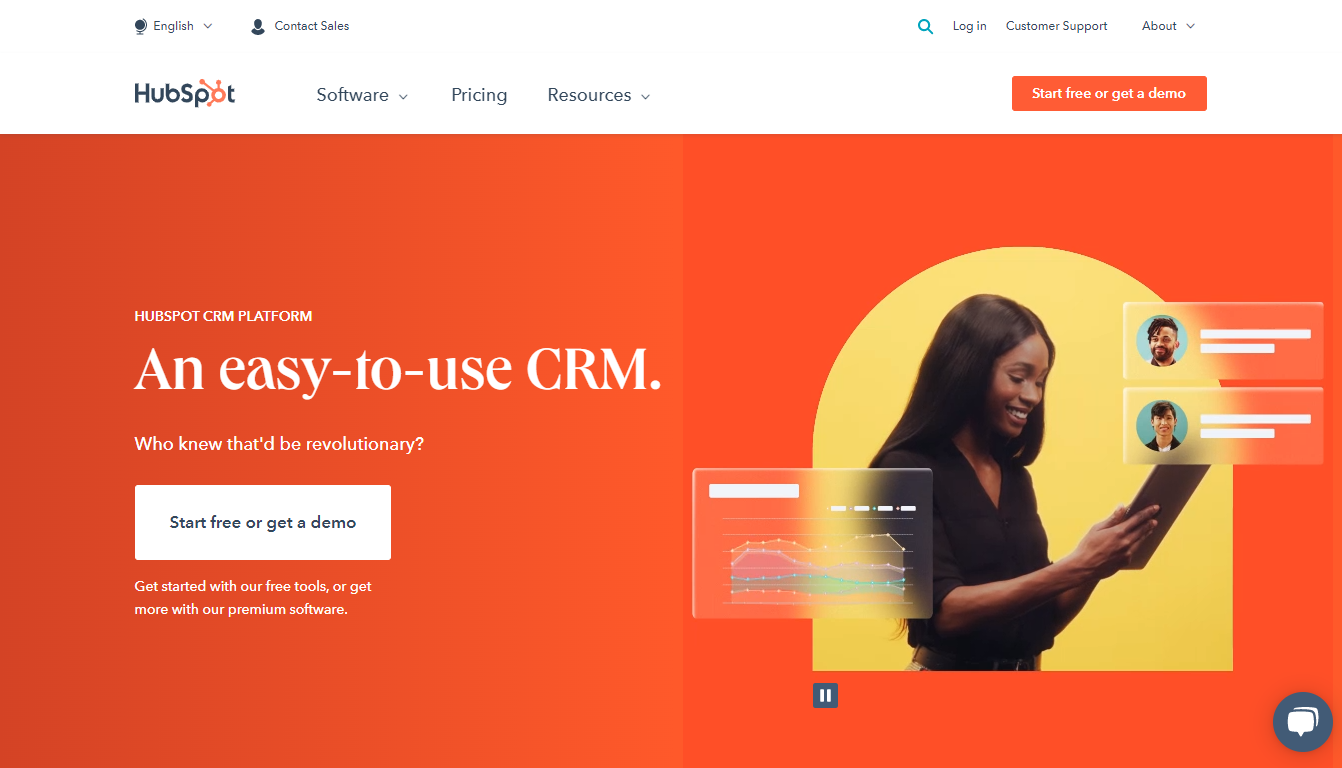
Here is what we love about HubSpot:
After your HubSpot free trial ends, you can choose any of their three paid plans:
Salesmate currently empowers over 4000 brands across 70 countries with comprehensive marketing plans designed to engage and entertain leads from multiple marketing channels.
Salesmate allows you to automate every customer integration by creating smart, action-based message triggers. Every time a customer fulfills a requisite action, they will automatically receive a pre-designed message from your end.
You can also segment users based on history and actions to send personalized emails automatically. Timely follow-ups nurture your leads better and increase your probability of retaining them.
Also, you can set up your account to send notifications and reminders for when high-quality leads take action. You can automate your customer’s journey at every point – from the first interaction to the final purchase with Salesmate.
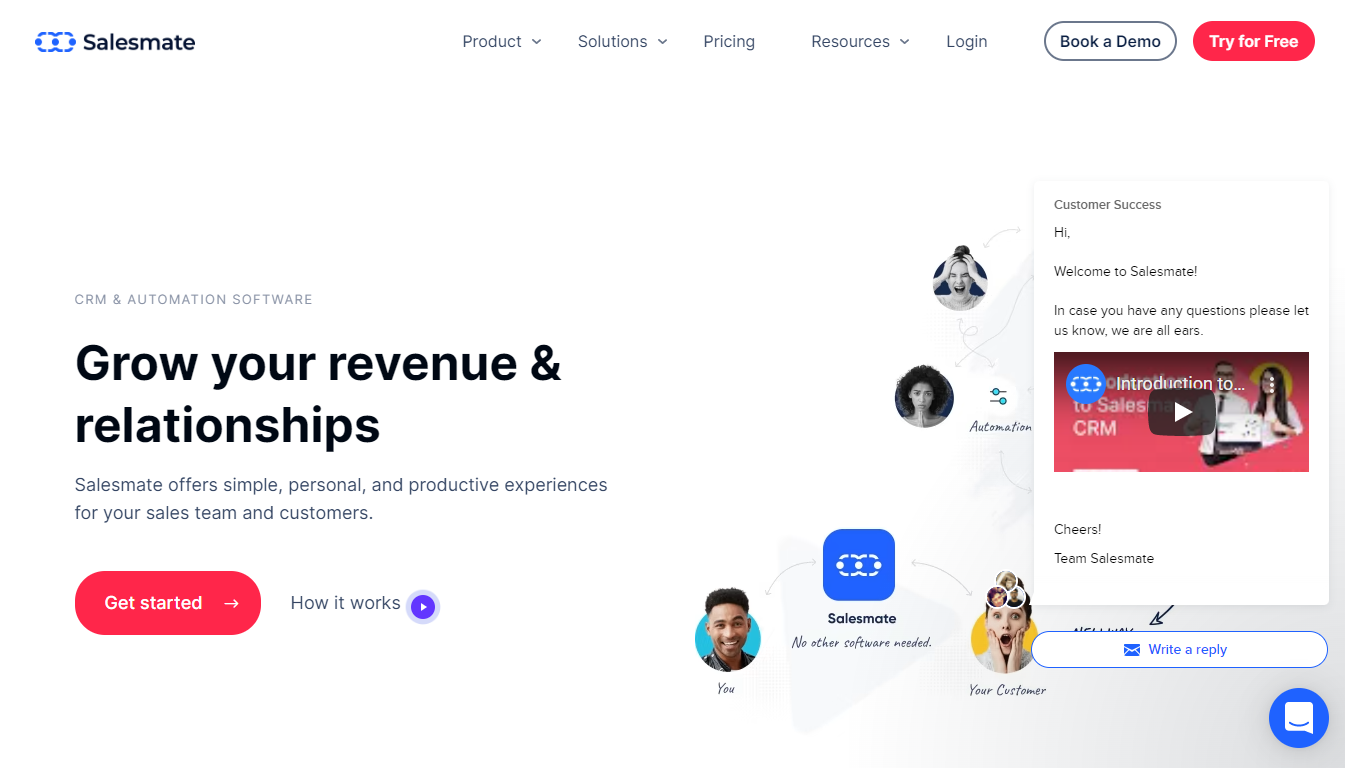
Here is what we love about Salesmate:
Salesmate comes with a free trial and 4 paid plans:
The biggest issue that most brands face with marketing automation is over-generalized messages and emails that do not directly appeal to individual users. Mailchimp, on the other hand, collects customer information and helps you create personalized experiences and journeys for each customer.
Also, to take away the burden of email scheduling, Mailchimp collects and analyses your customer data to recommend the most suitable timing for reaching out to them.
Suppose you have a store on e-commerce platforms like Shopify, Magneto, WooCommerce, or Bigcommerce. In that case, you can integrate it with your Mailchimp account and automate your eCommerce interactions with purchase-based emails.
Mailchimp’s social media marketing features are comparable to HubSpot. You can schedule posts, track engagement and diversify your social media marketing efforts on multiple channels.
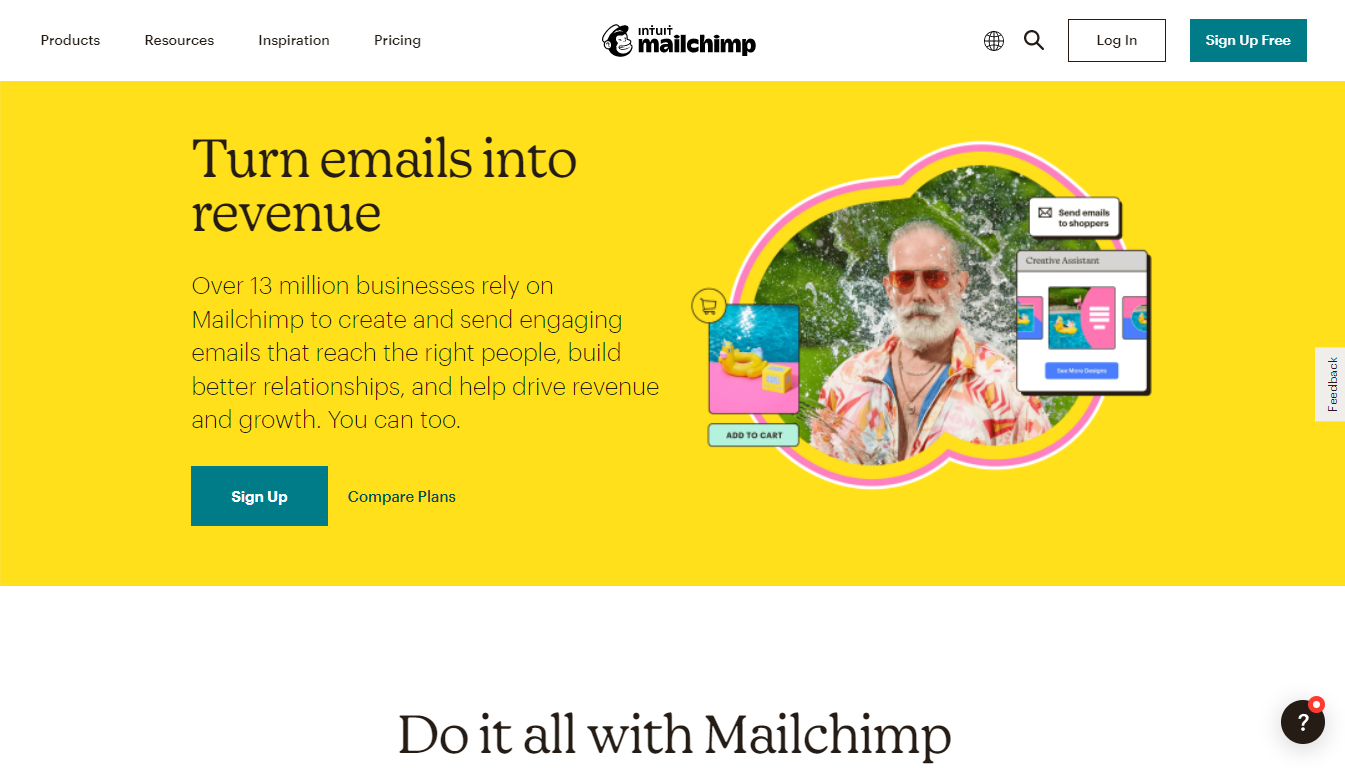
Here is what we love about Mailchimp
The free plan of Mailchimp covers almost all basic features like basic templates, marketing CRM, behavioral targeting, etc. Along with that, here are their paid plans:
Adequate information on your leads at every stage of customer interaction will ultimately translate to a high conversion rate, which is why Sharpring with its detailed insights, is definitely up there as the best marketing automation software.
Its powerful, dynamic forms integrate customer data directly with its built-in CRM system to minimize manual data transfer. Also, thanks to customizable form fields, you can create separate forms for different audience segments and only track information that will help your marketing campaign.
It also helps you identify the best leads every day and sends their details directly to your inbox. Using branching logic, Sharpspring engages your customers at critical points of the sales funnel to keep them hooked until you reach out to them.
The biggest strength of Sharpspring is its unique visitor ID. Instead of missing out on important leads, you can now identify them with their visitor ID and target them based on their personal information.
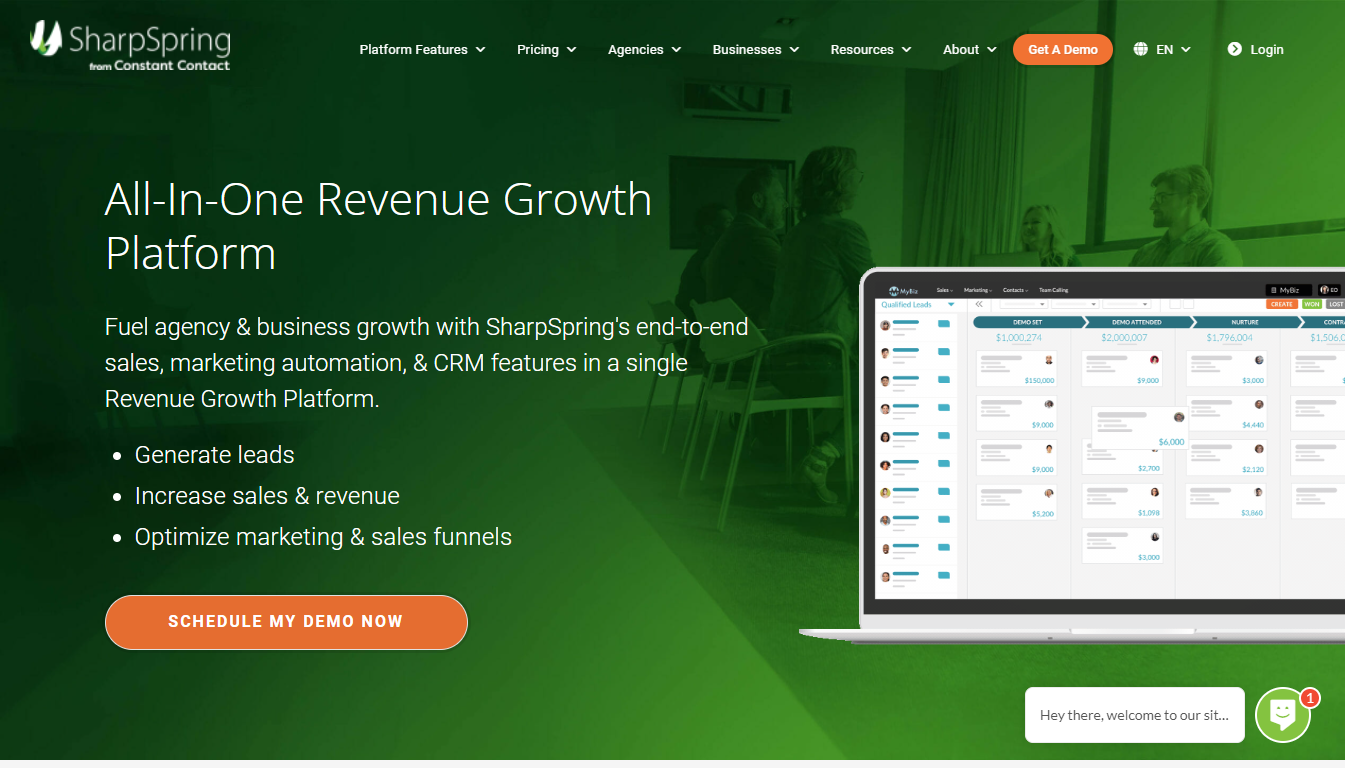
Here is what we love about Sharpspring:
The best part about Sharpspring is that its pricing is customizable, for the most part. Its “Small Business” plan for 1000 contacts comes at $399/month, whereas its “Enterprise” and “Agency” plans are open to customization. You can also get demos for both customizable plans.
ProsThe brand launched in 2014 and has since managed to build a loyal customer base of 70,000+ sales teams, including some of the most renowned brands like Hallmark and Jiggy.
Another impressive feature of Omnisend is its usability. Automatic marketing processes can be challenging at times, but not with Omnisend. Its easy-to-create workflows and no-code email automation make it accessible even to startups and solopreneurs without any tech expert.
Omnisend has both custom SMS and email templates that can be integrated with your customer journey to keep them engaged at every step.
Set your sales strategy on autopilot through a welcome sequence, cart recovery, and post-purchase marketing to drive revenue even when you are away.
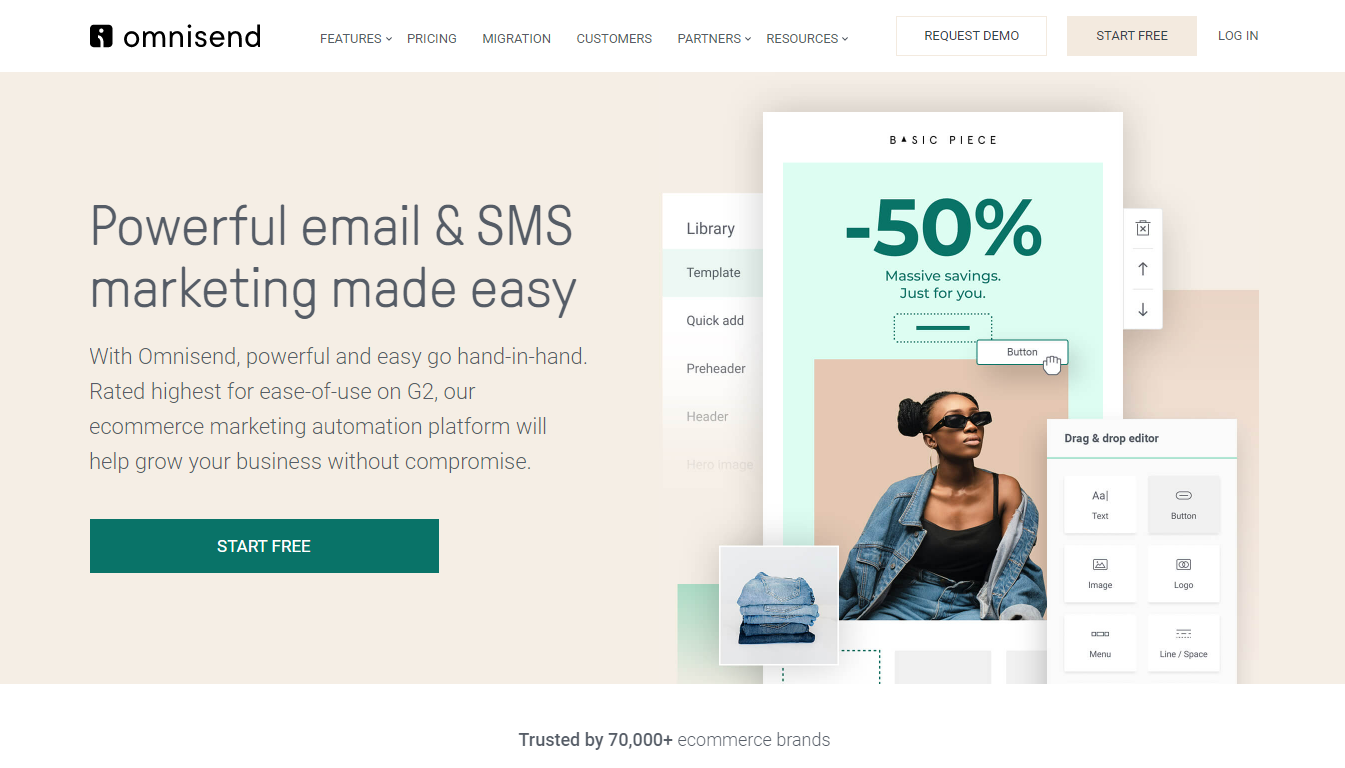
Here is what we love about it:
Omnisend’s free plan works for up to 250 contacts. After that, you will need to use any of these paid plans:
Moosend email marketing automation platform’s automated workflows are designed to give you the best conversion results. It simplifies automating marketing and focuses heavily on personalization.
One of the biggest benefits of this tool is its easy-to-use user onboarding feature. It automatically sends a welcome email as soon as a new user subscribes to your service, followed by an email to deliver set-up instructions at your chosen interval.
Creating automated workflows is extremely easy on Moosend. All that you have to do is drag and drop elements and set triggers that will result in a particular action. Select the event, add necessary filters and create the resulting task to automate crucial workflows forever.
Other important features include a multiple trigger setup that works best for brands with diverse target audiences. You can also create recurring emails on a loop to be sent out daily, weekly, or even monthly without your intervention.
You can also access all sensitive workflow data from any automated business process with a single click.
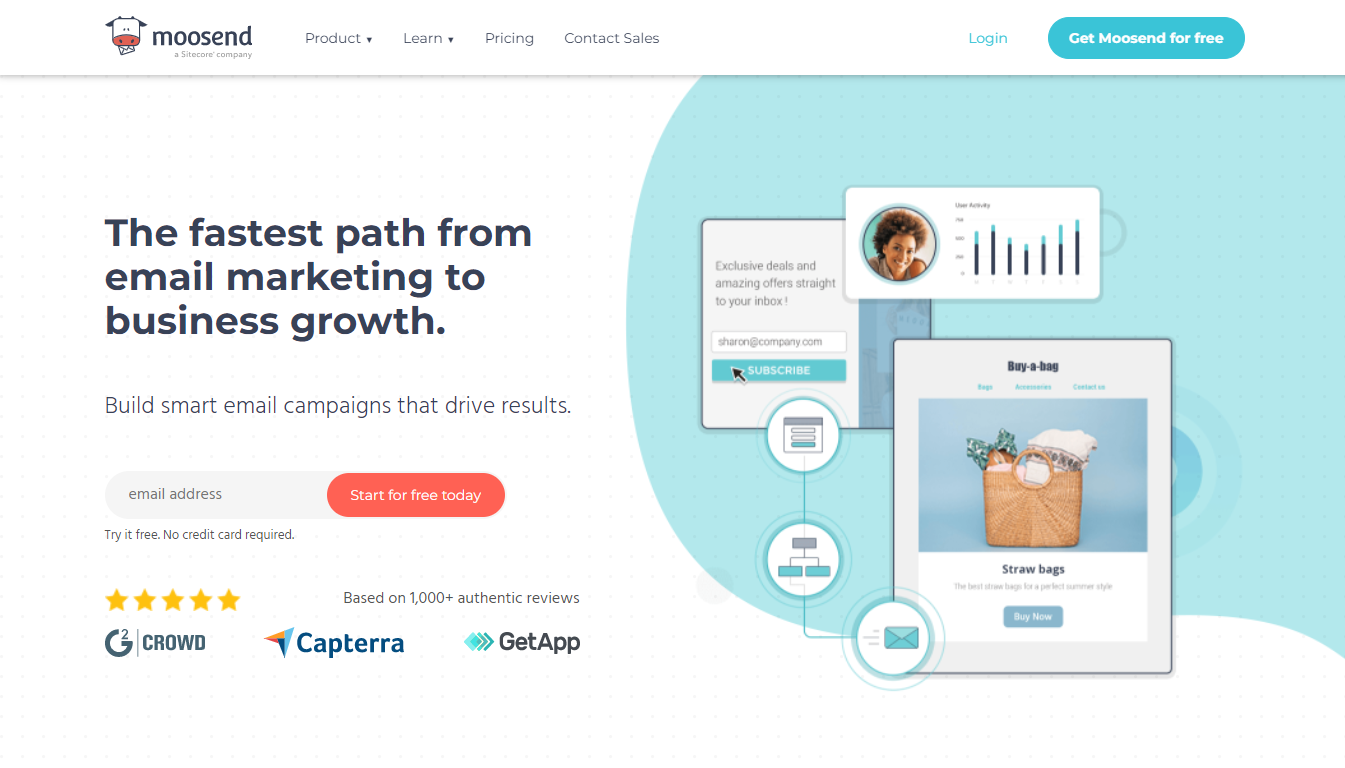
Here is what we love about Moosend:
Moosend offers a 30-day free trial with unlimited emails and workflow automation. After that, you can purchase any of these paid plans:
If you’re looking for a top marketing automation software to collect consumer data and boost your marketing strategy, Iterable is a good choice. Built with sophisticated technologies and features, this cross-channel marketing platform offers impressive scalability and speed.
Iterable AI powers modern personalization tools, which ensures better customer experiences. Iterable’s data-heavy approach is perfect for large-scale marketing campaigns. That said, it’s a viable software for businesses of any scale.
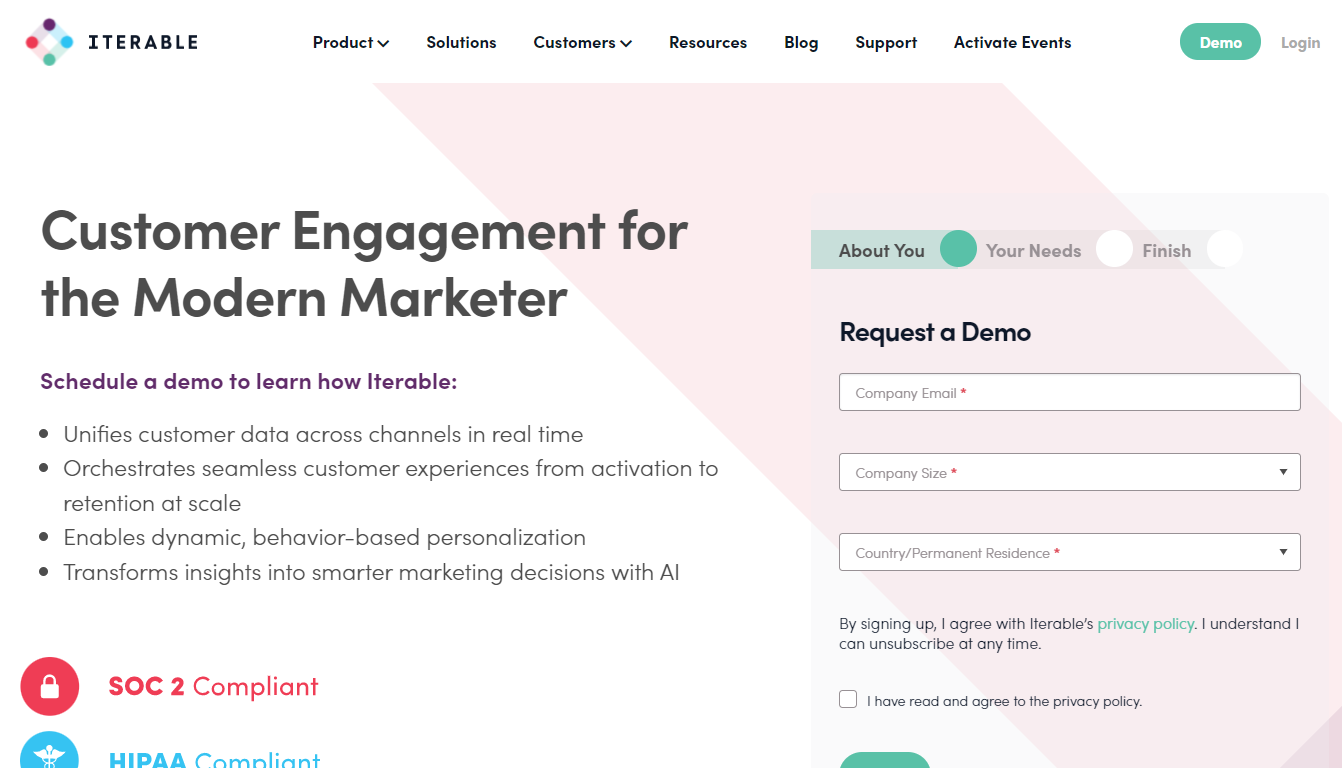
Here is what we love about Iterable:
Iterable does not have any fixed pricing plans. Instead, it offers a quotation-based approach wherein you can choose a custom plan as per the services and tools you desire. The ability to choose which services to opt for and which to exclude makes Iterable a cost-effective choice.
ProsLook no further than ActiveCampaign if you’re on the lookout for a marketing automation software with the best customer experience. This software offers a perfect blend of email marketing and CRM solutions, ensuring a comprehensive approach.
You can implement ActiveCampaign to serve multiple purposes in your campaigns — sales, marketing, and customer support.
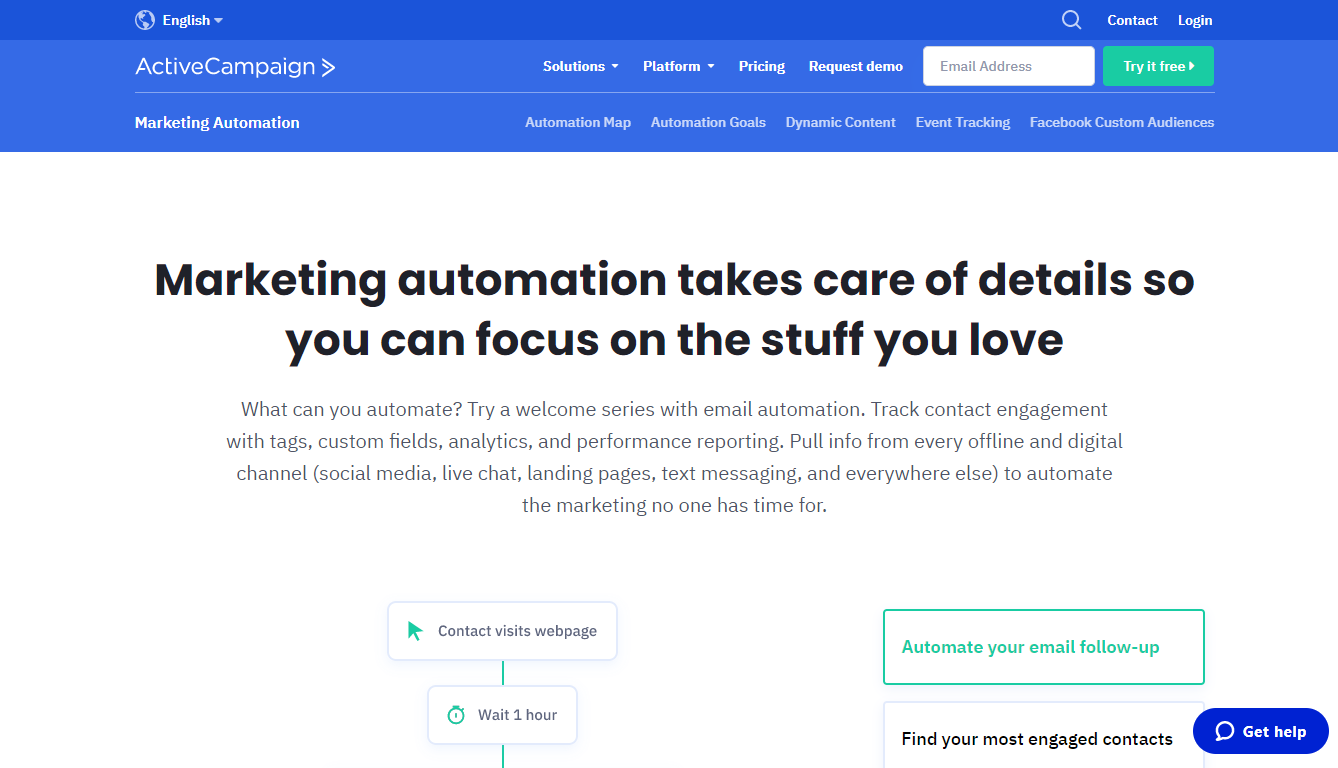
Here is what we love about ActiveCampaign:
While ActiveCampaign offers various pricing plans, the cost of each plan depends on the number of contacts. Here are the prices of different plans at different tires:
LitePardot is what you should be looking at if you need an automation tool for a B2B model rather than an eCommerce business. This software comes from Salesforce, a trendy platform among enterprises.
Pardot streamlines lead generation and help manage leads better. On average, Pardot helps organizations increase their campaign effectiveness by 37% and their ROI by 34%.
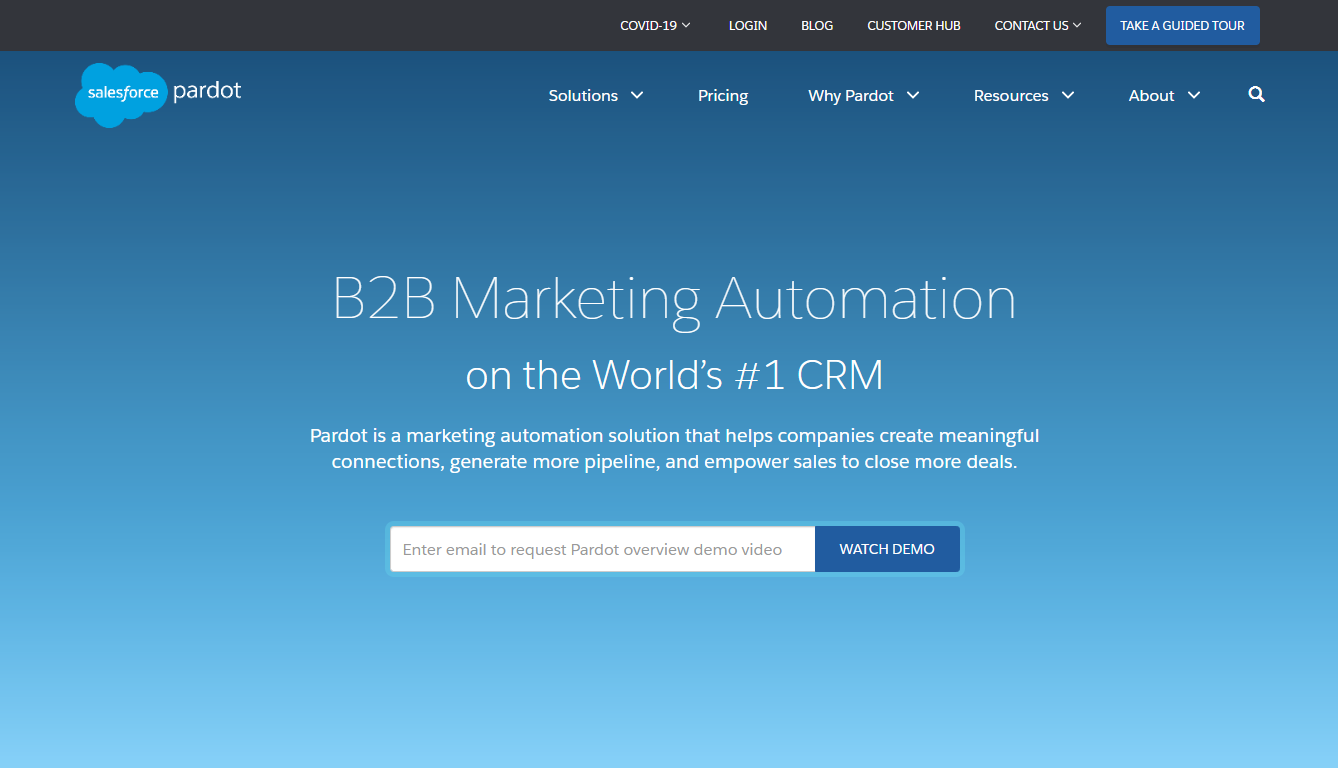
Here is what we love about Pardot:
Pardot offers four pricing plans:
GrowthPreviously known as Autopilot, Ortto is one of the best email marketing automation software with a variety of helpful templates that you can use to generate and nurture leads and reduce your overall manual effort. This omnichannel marketing software integrates with various platforms, such as Facebook Ads, Google AdWords, SMS, etc.
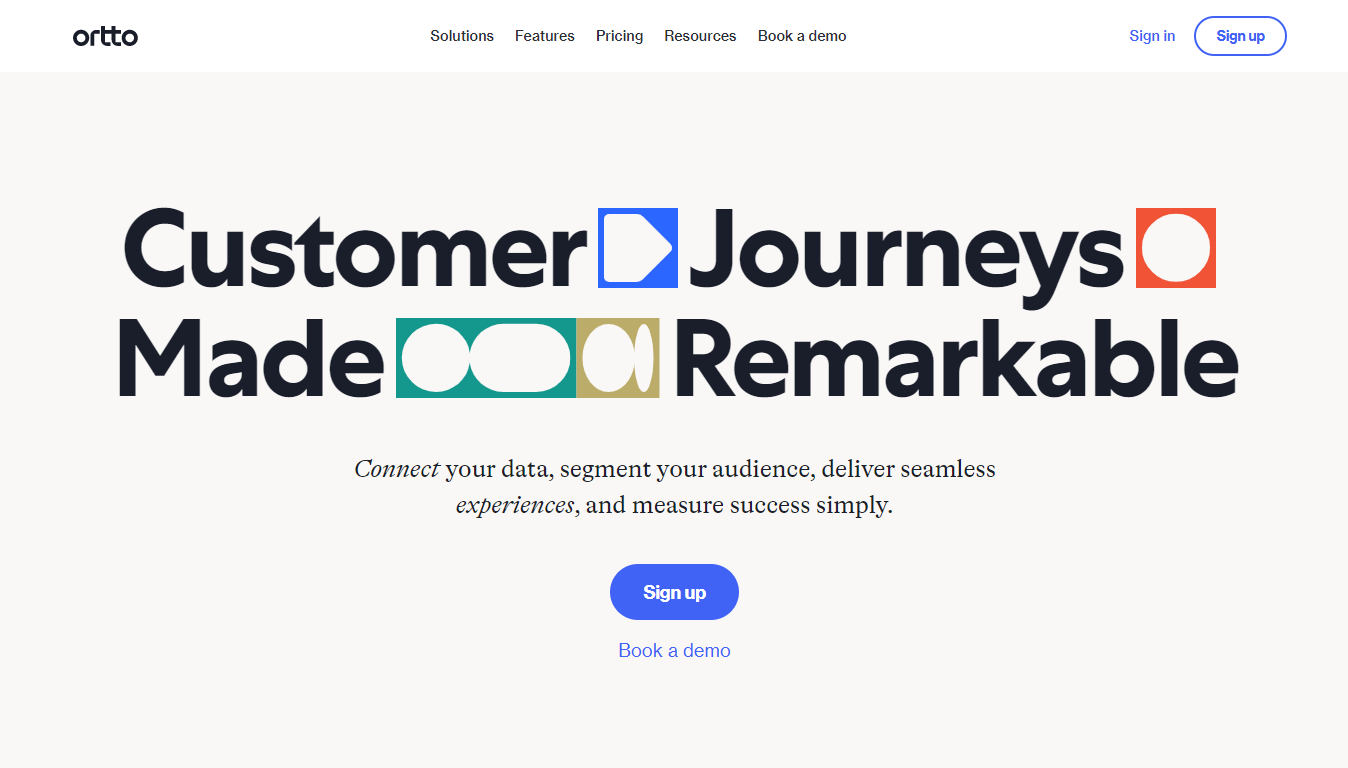
In addition to offering custom quotes for large enterprises, Ortto offers the following three payment plans:
CampaignFinding the best marketing automation software for your business is a tricky affair. After all, every business has its own requirements and preferences; two different businesses may not find the same software to be their best choice.
That said, you can’t really shy away from putting in the effort to find the best automation marketing software, as it will directly impact the success of your marketing campaign. Here are some factors to consider when shopping for a marketing automation software.
1. Your GoalsYour goals behind using the marketing automation software must be clear. Ensure that the software you choose aligns with your needs and offers all the necessary features and functionalities.
A good marketing automation software should help you achieve better conversion rates, greater customer satisfaction, increased ROI, new inward customers, etc. Also, make sure the software has adequate reporting tools to provide you with valuable insights.
2. Customer SupportIt’s only normal that you might need some assistance when you start using a new software. The availability of reliable customer service ensures a hassle-free experience and a smooth learning curve. Moreover, if the software breaks down or any bugs appear, you should be able to get it resolved quickly by a responsive customer support team.
Go through online reviews, and before you buy the software, get in touch with the support team to check how responsive and helpful the customer support is.
3. Learning ResourcesWe recommend you pick a top marketing automation software with plenty of learning resources to guide you, especially if you’re new to using a marketing automation software. Things like short videos, text guides, or even webinars on making the most of the software’s features will help you leverage the software the way it’s meant to be.
4. User BasePay attention to the user base when scouring through various marketing automation platforms. A software with a greater user base is obviously popular, but the important bit here is that it’s reliable. Going through first-hand customer reviews will give you an idea of what the audience feels about the software and whether or not it’s plagued by negative feedback.
You may also want to check whether the user base of a software consists of B2B or B2C companies. This will help you pick a local marketing automation platform perfect for your business.
5. CostNeedless to say, you must pick an automation software that fits within your budget. Take a detailed look at the pricing plans offered by different platforms and the features that tag along with each plan.
Generally, a marketing automation platform will have a base price and additional pricing tiers for a specified number of contacts and extra features. You may curtail your expenses by choosing a flexible software with cheaper plans and excluding extra features that you don’t need.
6. User-interfaceThe better the UI, the more convenient it will be to use the software. A free trial, in most cases, is the best way to find out whether or not an automation marketing software is for you.
Your choice should feature seamless navigation and provide you with contextual information when needed, such as for vague titles. This will also not only smoothen the learning curve but also enable you to use the software as efficiently as possible.
7. Native IntegrationsSound marketing automation platform comparisons are incomplete without a thorough understanding of their integrations. Focus on softwares that integrate natively with other softwares and tools you already use. Such integration with your existing technology will make it easier for you to get up and running with the new software.
Otherwise, you may have to tackle specific tasks manually or switch to technologies compatible with your new software, which will add to the overall cost of automation.
Conclusion: What Is The Best Marketing Automation Platform?Having discussed ten excellent marketing automation softwares inside out, our top pick for the best marketing automation software has to be HubSpot. First and foremost, it’s the most comprehensive marketing automation software out there — use it to automate your email marketing, social media marketing, lead tracking, lead data management, follow-up, etc. What’s more, it offers easy-to-build no-code workflows and seamless CRM integration, and the best part is that it offers all this in affordable packages.
FAQsWhat are marketing automation platforms?
Marketing automation platforms and softwares, as the name implies, are tools used to eliminate repetitive manual tasks involved in the sales and marketing efforts of a business or organization on online channels such as email, websites, etc., by using automated solutions instead. Such platforms require no software installation and can be simply used as a web-based or hosted solution.
What is an example of marketing automation?
Sending reminder emails to a customer a few weeks after the initial purchase is an excellent example of marketing automation. For instance, the service fee charged by Toyota makes for a good portion of its total revenue, the credit for which goes to the automated emails (in which they ask customers to schedule a service appointment for their car’s maintenance) its marketing platform sends out to customers every six months after the car purchase date.
Which is the best marketing automation software?
HubSpot is the best marketing automation software, mainly due to features like code-free automation sequences, detailed user insights, Salesforce integration, etc. It also allows you to schedule your social media posts well in advance and track post engagement, including brand mentions, conversions, etc. Furthermore, you can use HubSpot to automate lead data management, conversion and tracking, and email marketing.
How do I automate my marketing?
The first step to successfully automating your organization’s marketing is to zero in on the tasks you want automated, such as sending responsive emails. It’s a good idea to automate only those tasks that are time-consuming and monotonous. Next, select an adept marketing automation software, such as HubSpot and MailChimp. Lastly, train your team to make sure they understand how automation would warrant a change in their responsibilities; address and resolve any concerns or doubts they might have.
![]()
Krishi is an enthusiastic B2B and B2C content writer, always on the lookout to simplify software purchase decisions for businesses. Other hobbies include studying the financial markets and cricket!… View full profile ›
HubSpot Announces Claire Hughes Johnson Joins Board of Directors
CAMBRIDGE, Mass., March 24, 2022 /PRNewswire/ -- HubSpot, a leading customer relationship management (CRM) platform, announced today that Claire Hughes Johnson has joined the company's board of directors. Hughes Johnson brings more than two decades of experience in scaling high-growth companies and products.
HubSpot, Inc. logo - www.hubspot.com . (PRNewsfoto/HubSpot)
Hughes Johnson joins as Julie Herendeen transitions from the board. Herendeen joined HubSpot's board in 2016 and has supported the company through a period of rapid transformation that includes significant expansion across HubSpot's platform and Yamini Rangan's transition to CEO in 2021.
"First, I want to thank Julie for her support and guidance over the past six years. As one of HubSpot's first board members as a public company, Julie has been instrumental in navigating HubSpot through a period of tremendous growth and change. While I'm sad to see Julie go, I'm excited to be welcoming Claire to our board," said Brian Halligan, HubSpot's co-founder and Executive Chairperson. "Claire has impressive experience when it comes to scaling high-growth companies, as she was an executive at Google from 2004 to 2014 and COO at Stripe from 2014 to 2021. Her experience in payments at Stripe will be invaluable as we continue to build out HubSpot Payments in the coming years. In addition to being a great operator who has seen some great movies, she's a great person that I look forward to working with."
"The CRM industry has dramatically evolved during the pandemic, and I have tremendous respect for Yamini and her team for turning HubSpot into an engine for innovation during this time," said Hughes Johnson. "I'm thrilled to work alongside the rest of the Board as HubSpot continues to hone and scale its customer-centric approach."
Hughes Johnson's experience as chief operating officer at Stripe and vice president of multiple Google business teams, including Global Online Sales, Google Offers, and Google Self-Driving Cars, will be instrumental as HubSpot continues to build out its product offerings, including its natively built CRM-powered payments capabilities.
Story continues
Hughes Johnson is currently a corporate officer and advisor for Stripe, and she also serves on the boards of directors of the media company, The Atlantic; Ameresco, a leading renewable energy company; and self-driving company, Aurora Innovation.
"Throughout my career, I've worked with purpose-driven technology companies that create bold solutions to customers' most challenging problems. These past six years with HubSpot have been an incredible opportunity to do that, and I'm proud of the many milestones that HubSpot has achieved," said Herendeen. "There are many more ahead, and I'm confident that Claire and the rest of the board will do a great job supporting HubSpot as it enters this exciting new chapter. It's been a pleasure working with HubSpot and my fellow board members, and I wish them the best of luck."
To learn more about HubSpot's board of directors, please visit https://www.hubspot.com/company/board-of-directors.
About HubSpot
HubSpot (NYSE: HUBS) is a leading customer relationship management (CRM) platform that provides software and support to help companies grow better. The platform includes marketing, sales, service, operations, and website management products that start free and scale to meet our customers' needs at any stage of growth. Today, more than 135,000 customers across more than 120 countries use HubSpot's powerful and easy-to-use tools and integrations to attract, engage, and delight customers.
Named Glassdoor's #2 Best Place to Work in 2022, HubSpot has been recognized for its award-winning culture by Great Place to Work, Comparably, Fortune, Entrepreneur, Inc., and more. HubSpot was founded in 2006 and is headquartered in Cambridge, Massachusetts. The company's thousands of employees work across the globe in HubSpot offices and remotely.
Learn more at www.hubspot.com.
Cision
View original content to download multimedia:https://www.prnewswire.com/news-releases/hubspot-announces-claire-hughes-johnson-joins-board-of-directors-301509531.html
SOURCE HubSpot
8 Free Courses For Writers & Content Marketers
Increasing online competition and advancements in search technologies mean that writing content is about more than just having a solid grasp of the English language.
Great content that performs well takes into account a variety of marketing factors that not even the most seasoned writers are necessarily familiar with.
Before beginning to write content, you’ll want to consider:
It’s safe to say that if you want to write successful content that gets a lot of attention, it’s probably a good idea to get some training on both writing and marketing.
Fortunately, getting the training you need doesn’t have to mean shelling out a lot of money from your budget.
There are tons of free online courses that can help you learn everything you need to know to get the links and shares your business needs.
Read on for some favorites from myself and friends!
Top 8 Free Online Courses On Content Marketing & WritingDisclaimer: I have not taken all of the courses listed below, but I have taken a few, and I know at least one person who has recommended the others.
They’ve also received numerous positive reviews from the hundreds of others who have taken the courses.
Without further ado, below are some of the best out there.
Skillshare CoursesSkillshare allows you to start free for 14 days, and then after that, it is a yearly fee of $96.00.
Once you pay for the membership, all of the classes are free within Skillshare.
If you don’t want to purchase a membership, the courses below can be purchased separately for anywhere from $10-20.
Still, I’ve added them to the list because you can get quite a few courses done for free during your 14-day trial.
1. Content Marketing: Blogging for Growth
This course is taught by Eric Siu, CEO of Single Grain and Founder at Growth Everywhere.
This 80-minute class will teach you various blog-writing styles, how to brainstorm a topic, and then develop your notes from a brainstorming session to a full-on blog post. He even goes into detail on how to create an engaging headline and feature image.
This is a beginner course perfect for business owners and marketers, and it has a 95% positive review rate.
At the end of the course, you’ll have written an original blog post to share, which hopefully will be the first in a successful content marketing strategy!
2. Become a Better Blogger: Content Planning
This is a course by Andrea Goulet Ford of Corgibytes, a team of expert developers who not only offer maintenance services, but courses to boot!
Ford was an unknown name to me, but her loyal followers seem to swear by her advice, so I gave the course a try and was very impressed.
She has worked with government agencies, Fortune 500 companies, and many more across the board.
This subject matter seems fairly simple, but planning can be very intricate. She helps you create a resource library to refer back to in the future, AND she makes sure that you walk away with three months’ worth of online content all planned out.
Udemy CoursesUdemy is probably the most popular avenue for online marketers when it comes to taking free classes.
They have free options (all mentioned below) as well as paid options and offer more than 32,000 courses, 18,000 instructors, and 80+ course languages.
3. Content Marketing for B2B Enterprises
This course is best for B2B companies, but it’s worth mentioning because it’s one of the few good Udemy classes that are free.
The course is by William Flanagan, CEO and Founder of Audienti, and it’s great because it uses actual scenarios that Flanagan has dealt with in his own business as well as of his clients.
There are six sections to the class, including Creating Interesting Relevant Content, Publishing Content for Conversion, and Getting Content in front of Your Audience.
4. WordPress for Beginners: Create a Website Step by Step
This might seem unconventional, but part of content marketing is knowing how to take advantage of all WordPress has to offer.
This is important for SEO as well as user experience.
The course covers posts vs. pages, the Content Editor, media files, categories and tags, content widgets, and more confusing little options you have.
It’s a basic course and best for beginners, but necessary if you have any questions about what WordPress can offer.
Coursera CoursesCoursera courses are on the rise.
The education platform partners with top universities and organizations worldwide and makes it easy for anyone to sign up (similarly to Udemy, except it’s a bit pricier and works with colleges and universities).
Coursera also has one of the largest libraries of classes in all different categories, so this is one of my favorite platforms.
5. Content Strategy for Professionals Specialization
There are four parts to this course: “Engaging Audiences,” “Managing Content,” “Expanding your Content’s Reach,” and “Ensuring your Content’s Impact.”
The course ends with a final capstone project where you use the knowledge you’ve gained in the prior four courses to design a content strategy package.
The course says that it is designed for entry-level, for-profit, non-profit, volunteer, and government enterprises, and it’s a great way to learn some of the basics of content marketing and how it can relate to a business strategy as a whole.
It’s a beginner-level course, and if you spend approximately two hours per week on the classes, you will finish in about four months.
The best part is it’s completely free, although you do have the option of getting a Verified Certificate from Northwestern University for completing the course for $49.00.
6. High-Impact Business Writing
This is the only course on the list that isn’t free, but it’s only $35 for eight hours of videos, readings, and quizzes, which is pretty inexpensive for a Coursera course from the University of California, Irvine.
This course is unique because it’s one of the few options that put a heavy focus on the actual act of writing as opposed to content marketing.
It teaches you how to write and communicate effectively in the business world.
Naturally, a lot of this is writing for an online audience and online publications (although it does get into writing business proposals, memos, etc.). If polishing up your writing skills is what you’re after, this single-course is a great option.
This course is part of a 10-course series called Career Success Specialization, which you can opt to take from the link above.
General Website CoursesIf you keep an eye out, you’ll notice different agencies and businesses around the web oftentimes offer courses taught by their professionals. Below are two of my favorites:
7. HubSpot’s Inbound Certification
This course doesn’t focus on writing or content marketing specifically, but it’s worth mentioning if you’re interested in how those two areas help an online strategy as a whole.
You learn everything from creating landing pages, closing sales, and more.
HubSpot is one of the leading marketing resources on the web with some of the best content featured on their five blogs, so their course is no doubt top-notch.
Once you pass the course, you get a personalized badge and certificate that you can display on your website, email signature, LinkedIn profiles, etc.
8. Online Marketing Institute: Content Storytelling Rules for the Digital Marketer
Much like Skillshare, the Online Marketing Institute offers a free trial that allows you to try any courses you wish.
They have 70 different content marketing classes to choose from all sorted by Beginner, Intermediate, and Advanced level.
The Content Storytelling class is pretty unique because it helps you understand storytelling fundamentals and how you can get creative so your content is more engaging.
Creativity is something that many businesses are lacking, so this is a cool course if you’re looking to step outside of your comfort zone.
ConclusionGood content writers are in high demand, and we don’t see that changing any time soon.
It’s even possible to make a full-time income just through content writing if you take the time to learn the ins and out of the business.
The list above is a great starting point if you’re looking to expand your content writing skills, but it’s by no means an all-inclusive list.
More Resources:
Featured Image: GaudiLab/Shutterstock

Comments
Post a Comment
If you have any doubt, please let me know....